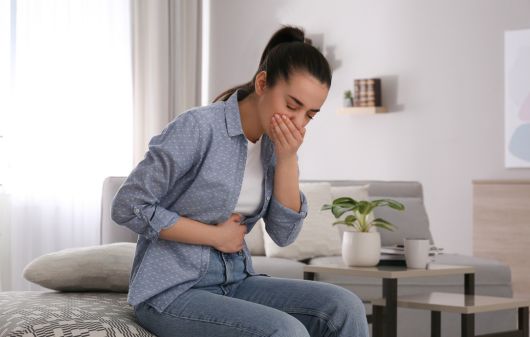
Get Stomach Flu Treatment Online
You can now connect with an online doctor for Stomach Flu treatment online through our easy-to-use app. Ibuprofen (Advil), loperamide (imodium), Dimenhydrinate, Metoclopramide and Ondansetron are majorly prescribed and recommended options for treating Stomach Flu.
Stomach flu, also known as viral gastroenteritis, is a viral intestinal infection primarily contracted through consuming contaminated food. Get a prescription now with one of our doctors at Your Doctors Online.
Symptoms of stomach flu
The main symptoms of stomach flu (gastroenteritis) are watery diarrhea and vomiting. Nausea, cramps, fever, gastrointestinal distress, and headaches are some other commonly experienced symptoms.. Signs of dehydration include excessive thirstiness, lightheadedness, dry skin and mouth, and frequent episodes of vomiting and diarrhea.
Causes of ear infection
Viruses, particularly rotavirus and norovirus, are the leading causes of stomach flu. Bacteria like E. coli and salmonella can also cause the stomach flu. Transmission of these diseases can occur through direct touch with an infected individual, consumption of contaminated food or drink, or failure to wash hands after handling bodily fluids such as pee or diapers.

Treatment of Stomach flu
The main goals of stomach flu treatment are to avoid dehydration and manage associated symptoms. Treatment involves administering oral rehydration solutions to both children and adults, gradually reintroducing bland, easily digestible foods to the diet, and avoiding dairy, caffeine, and alcohol until the person has fully recovered. It is important to seek medical assistance if you notice any signs of dehydration or if your symptoms last longer than a week.
Gastroenteritis (Stomach flu) medication we prescribe
Antibiotic
Learn MoreAntibiotic
Learn MoreAntibiotic
Learn MoreHow to connect with doctor for stomach flu
Connect with a health care professional online in 3 easy steps.
1
Describe your Issue
Download our app, register and tell us about your medical issue to get started.
- Stomach Flu
- Anemia
- STD
- UTI
- Skin
- Covid
2
Chat with a Doctor
Connect with a board-certified doctor. You can chat, send pictures and videos.
Hey Dr. Nicole, I experience stomach pain and diarrhea. Can you help me?
3
Get Prescription
Our Online doctors can help you with your medical issues and give you prescriptions.
Prescription
- Loperamide 4mg
- Twice a day for 2 days
Send Prescription
How to prevent Stomach Flu?
To keep the stomach flu at bay, it’s important to wash your hands often, disinfect frequently touched surfaces, and stay away from any food or water that could be contaminated. Preventing severe rotavirus illness in children is possible through ensuring routine vaccination against the virus.
FAQs About Stomach Flu
How to treat stomach flu without going to the doctor?
You can treat stomach flu without going to the doctor by connecting with a virtual healthcare provider with Your doctors online. After downloading the app, you will be asked questions regarding your presenting symptoms, and treatment along with prescription will be provided online.
How do online doctors treat stomach flu?
Online doctors can help treat stomach flu by diagnosing the problem and giving online prescriptions. You can talk with one of our doctors online through our app at Your Doctors Online.
How do you get rid of a stomach virus in 24 hours?
Adopt a bland diet featuring non-irritating foods such as broth. Ensuring proper fluid intake to counter dehydration from vomiting and diarrhea is crucial. Over-the-counter medications can provide symptom relief.
When should I consider seeking medical attention for stomach flu symptoms?
Medical attention is recommended if symptoms persist after two days, severe diarrhea occurs, blood is present in diarrhea, or fever exceeds 105°F. Consult Your Doctors Online for treatment and prescription, especially for children under three.
How is stomach flu usually treated in children vs adults?
The treatment options are the same for both children as well as adults. Taking enough hydration, eating easily digestible foods, and rest improves the condition in 2-3 days. However, it is essential to note that if the diarrhea is severe, consult a doctor immediately, especially if the child is three years or less. Get a consultation from Your Doctors Online to treat stomach flu infection.
Are there complications associated with untreated stomach flu?
If stomach flu is not treated promptly, it can cause severe complications like dehydration, kidney failure, neurological issues, or even death. Acute gastroenteritis can cause diarrhea, vomiting, abdominal discomfort, etc. Antibiotic treatment can save you from facing these adverse side effects.
-Phindile Mkhatshwa
-brooke snow
-Okiti Stephanie
-ASIF Khan
-Chelsey
-edith bien aime
-Lesego Thejane
-Stephanie Brown
-kulwinder gill
-Elijah Mark
Get Started Today
Talk to online doctors now and get medical advice, online prescriptions, refills, lab requisitions and medical notes within minutes. On-demand healthcare services at your fingertips.





